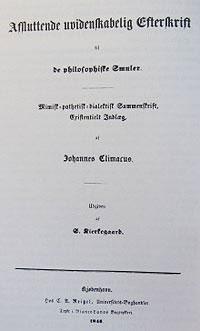Concluding Unscientific Postscript to Philosophical Fragments

Titlepage, first edition
|
|
| Author | Søren Kierkegaard |
|---|---|
| Original title | Afsluttende uvidenskabelig Efterskrift til de philosophiske Smuler |
| Translator | David F Swenson and Walter Lowrie, Howard V. Hong and Edna H. Hong, Alastair Hannay |
| Country | Denmark |
| Language | Danish |
| Series | First authorship (Pseudonymous) |
| Genre | Philosophy |
| Publisher | University bookshop Reitzel, Copenhagen |
|
Publication date
|
Feb 28, 1846 |
|
Published in English
|
1941 |
| Media type | Hardback |
| Pages | 630 (Hong translation) |
| ISBN | |
| Preceded by | Stages on Life's Way |
| Followed by | Two Ages: A Literary Review |
Concluding Unscientific Postscript to the Philosophical Fragments (Danish: Afsluttende uvidenskabelig Efterskrift til de philosophiske Smuler) is a major work thought to be by Søren Kierkegaard. The work is a poignant attack against Hegelianism, the philosophy of Hegel, especially Hegel's Science of Logic. The work is also famous for its dictum, Subjectivity is Truth. It was an attack on what Kierkegaard saw as Hegel's deterministic philosophy. Against Hegel's system, Kierkegaard is often interpreted as taking the side of metaphysical libertarianism or freewill, though it has been argued that an incompatibilist conception of free will is not essential to Kierkegaard's formulation of existentialism.
As the title suggests, the Postscript is sequel to the earlier Philosophical Fragments. The title of the work is ironic because the Postscript is almost five times larger than the Fragments. The Postscript credits "Johannes Climacus" as the author and Kierkegaard as its editor. Like his other pseudonymous works, the Postscript is not a reflection of Kierkegaard's own beliefs. However, unlike his other pseudonymous works, Kierkegaard attaches his name as editor to this work, showing the importance of the Postscript to Kierkegaard's overall authorship.
When I began as an author of Either/Or, I no doubt had a far more profound impression of the terror of Christianity than any clergyman in the country. I had a fear and trembling such as perhaps no one else had. Not that I therefore wanted to relinquish Christianity. No, I had another interpretation of it. For one thing I had in fact learned very early that there are men who seem to be selected for suffering, and, for another thing, I was conscious of having sinned much and therefore supposed that Christianity had to appear to me in the form of this terror. But how cruel and false of you, I thought, if you use it to terrify others, perhaps upset every so many happy, loving lives that may very well be truly Christian.
It was as alien as it could possibly be to my nature to want to terrify others, and therefore I both sadly and perhaps also a bit proudly found my joy in comforting others and in being gentleness itself to them-hiding the terror in my own interior being.
...
Wikipedia
